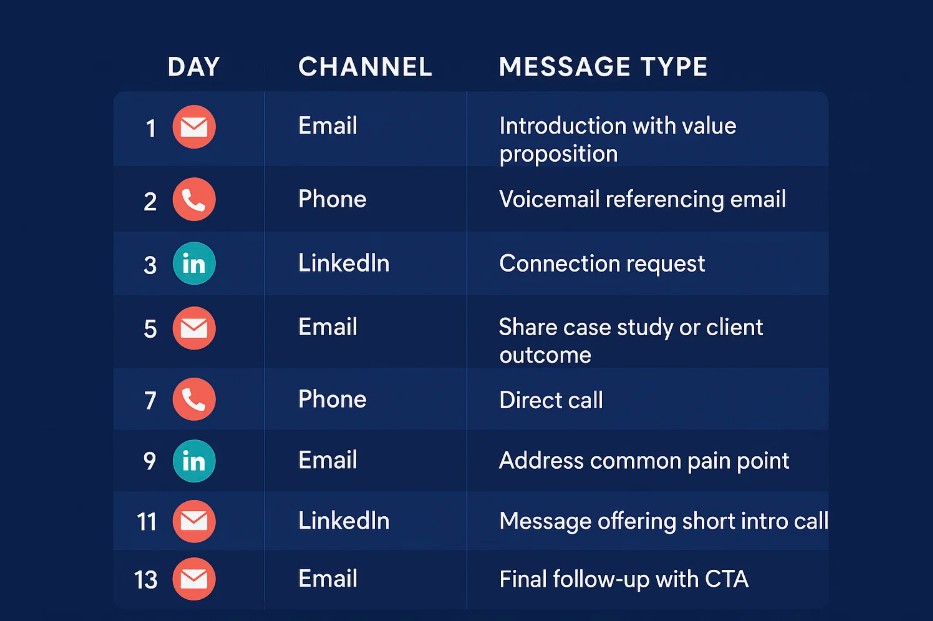For accounting firms looking to grow their client base, B2B appointment setting is one of the most effective strategies to get in front of qualified decision-makers. But not all appointment-setting strategies are created equal. Random cold calls or templated email blasts might get a few responses, but if your team isn’t focused on targeting the right prospects and guiding them through a structured qualification and booking process, you’ll waste time and miss revenue opportunities.
In this article, we’ll walk through a complete, step-by-step process for B2B appointment setting accounting professionals can rely on. You’ll learn how to build the right team, define lead qualification criteria, execute strategic outreach, and turn conversations into booked meetings with real potential.
Contents
- 1 Why Appointment Setting Matters for Accounting Firms
- 2 Step 1: Define Your Ideal Client Profile (ICP)
- 3 Step 2: Create the Right Appointment-Setting Team
- 4 Step 3: Build the Outreach Sequence
- 5 Step 4: Qualify the Leads Before the Call
- 6 Step 5: Schedule and Confirm the Meeting
- 7 Step 6: Run a High-Impact Discovery Call
- 8 Step 7: Track Metrics and Optimize the Process
- 9 4 Common Mistakes to Avoid
- 10 Real-World Example: How One Firm Added $500K in Pipeline
- 11 Why Outsourcing Appointment Setting Works for Accounting Firms
- 12 Ready to See How It Works?
- 13 Final Takeaways
Why Appointment Setting Matters for Accounting Firms
Accounting is a relationship-driven business. Whether you offer tax planning, bookkeeping, advisory services, or fractional CFO support, new clients are unlikely to buy from a single touch. They want to understand your expertise, trust your team, and know that your services are a fit for their needs.
That relationship often begins with a discovery or consultation call, which doesn’t happen without a solid appointment-setting system in place.
A consistent appointment-setting program helps your firm:
- Fill your pipeline with qualified leads
- Free up partners and CPAs to focus on closing, not prospecting
- Create predictable revenue opportunities
- Shorten the sales cycle with pre-qualified calls
- Build credibility through structured outreach
Step 1: Define Your Ideal Client Profile (ICP)
Before outreach begins, you need to be clear on who you want to connect with. Vague targeting leads to wasted time on unqualified prospects.
Build a detailed ICP by identifying:
- Industry: e.g., construction, real estate, SaaS, eCommerce
- Company size: annual revenue, number of employees
- Decision-makers: Owner, CFO, Controller, COO, Office Manager
- Location: local, regional, national
- Pain points: struggling with taxes, disorganized books, no internal finance team
Knowing your ICP allows your appointment setters to tailor messaging and build lists that align with your core services.
Step 2: Create the Right Appointment-Setting Team
A successful B2B appointment setting strategy involves collaboration between several roles:
Sales Development Representative (SDR)
Your SDR is the front line of outreach. Their job is to:
- Research prospects
- Execute outbound calls, emails, and social touches
- Qualify leads based on set criteria
- Book discovery calls for your partners or closers
Campaign Strategist or Sales Manager
This person oversees the campaign and ensures outreach is aligned with business goals. They help refine the targeting strategy, monitor KPIs, and coach the SDR team.
Closer or Partner
This is the CPA or business partner who conducts the discovery call and eventually closes the deal.
Marketing Support
Your marketing team can create collateral (case studies, one-pagers, landing pages) to support the SDR’s outreach and build trust early in the process.
Step 3: Build the Outreach Sequence
Your goal is to create a multi-touch, multi-channel sequence that gets your prospect’s attention without being intrusive or pushy.
Best practices for accounting firm outreach:
Channel Mix:
- Email: Personalized outreach with value-based messaging
- Phone calls: Voicemail drops with a clear call to action
- LinkedIn: Connection requests and value-first messages
Sequence Example (10-12 touches over 15 business days):

Key Messaging Elements:
- Focus on their industry and challenges
- Offer a reason to talk (“tax savings audit,” “fractional CFO consult”)
- Keep it short and conversational
- Include a clear next step (calendar link or offer to send times)
Step 4: Qualify the Leads Before the Call
Not every response should result in a meeting. Your SDRs must qualify prospects before booking a time on your calendar.
Qualification Criteria for Accounting Leads:
- Need: Do they need tax, bookkeeping, advisory, or CFO support?
- Timing: Are they looking for help now or just browsing?
- Budget: Do they have the resources for your services?
- Decision-maker: Are they the ones who will hire the firm?
- Current situation: Are they switching firms? Do they use in-house staff?
Use a structured lead qualification framework like BANT (Budget, Authority, Need, Timing) to ensure only high-quality prospects are passed through.
Sample Qualifying Questions:
- “What’s prompting the search for a new accounting partner?”
- “Are you currently managing this in-house or working with another firm?”
- “Is this something you’d like to address in the next 30 to 60 days?”
Step 5: Schedule and Confirm the Meeting
Once the prospect is qualified, booking the call is the most important next step. SDRs should not only schedule the meeting but also ensure the prospect shows up.
Best Practices for Scheduling:
- Use a scheduling tool like Calendly or HubSpot Meetings
- Offer two to three time slots, based on the closer’s availability
- Send a calendar invite immediately
Reduce No-Shows by:
- Sending a confirmation email with a brief agenda
- Including links to your website, testimonials, or relevant blog content
- Sending a reminder the day before and one hour before the call
Step 6: Run a High-Impact Discovery Call
Your closer or partner should approach the discovery call with a consultative mindset. The goal is not to pitch right away but to uncover needs, build trust, and see if there’s a mutual fit.
Discovery Call Structure:
- Warm-up: Thank them for their time, set expectations for the call
- Current state: Ask about their current accounting process and challenges
- Future goals: What does success look like for them?
- Gap analysis: Where are they now vs. where they want to be?
- Your solution: Tailor your pitch based on what they’ve shared
- Next steps: Propose a follow-up or send a proposal
Step 7: Track Metrics and Optimize the Process
Appointment setting is a numbers game, but it’s also about continuous improvement. Measuring the right KPIs allows you to tweak your approach and maximize ROI.
Key Metrics to Track:
- Dials made / Emails sent
- Connection rate: % of conversations with real prospects
- Meeting conversion rate: % of leads that turn into meetings
- No-show rate: % of booked calls that are missed
- SQL to close rate: % of qualified calls that turn into clients
Tools That Help:
- CRM systems like Salesforce or HubSpot
- Dialers like PhoneBurner or Aircall
- Email sequencing tools like Outreach, Mailshake, or Reply.io
- Scheduling tools like Calendly
4 Common Mistakes to Avoid
Even experienced firms make appointment-setting missteps that cost time and money. Here’s what to avoid:
1. No Defined ICP
Going after everyone means wasting time on the wrong leads.
2. Poor SDR Training
If the person making first contact doesn’t understand your services, they can’t spark interest or ask the right questions.
3. Booking Unqualified Leads
Clogging your calendar with bad-fit calls just burns out partners and slows down real opportunities.
4. Weak Follow-Up
If you don’t follow up consistently, you’ll lose deals to competitors who do.
Real-World Example: How One Firm Added $500K in Pipeline
A mid-sized accounting firm in the Southeast hired a dedicated appointment-setting team to reach business owners in healthcare, construction, and professional services.
Here’s what they did:
- Used a 15-touch outbound sequence with SDRs calling and emailing daily
- Created a custom ICP around firms with 10–100 employees and $2M+ in revenue
- Qualified leads before every meeting
- Sent automated confirmations and pre-call resources
Results after 90 days:
- 130 discovery calls booked
- 85 qualified prospects
- 32 proposals sent
- 14 new clients won
- Estimated new revenue: $500,000
Why Outsourcing Appointment Setting Works for Accounting Firms
Building this system in-house requires time, talent, and tools. Many accounting firms don’t have the bandwidth or internal expertise to run a consistent outreach engine.
That’s where a partner like Abstrakt comes in.
We specialize in B2B appointment setting for accounting firms, using proven processes that deliver real results. Our dedicated SDRs handle everything from list building and outreach to qualification and scheduling. You get qualified, sales-ready meetings placed directly on your calendar, so your team can focus on closing, not chasing.
Ready to See How It Works?
If you’re ready to increase your pipeline with consistent, qualified meetings, we’d love to show you how our program works.
Book a live demo to see how B2B appointment setting can help your accounting firm grow faster and smarter.
Final Takeaways
- B2B appointment setting is essential for firm growth, not just a sales tactic
- Defining your ICP and building a strategic outreach plan is step one
- SDRs, closers, and campaign strategists all play a critical role
- Qualification is key to protecting your calendar and closing more
- Measured and optimized programs consistently deliver ROI
- Outsourcing can save time, reduce cost, and drive faster results
With the right system in place, your accounting firm can turn outbound activity into real conversations, real proposals, and real growth.
- Madison Hendrixhttps://www.abstraktmg.com/author/mhendrixabstraktmg-com/
- Madison Hendrixhttps://www.abstraktmg.com/author/mhendrixabstraktmg-com/
- Madison Hendrixhttps://www.abstraktmg.com/author/mhendrixabstraktmg-com/
- Madison Hendrixhttps://www.abstraktmg.com/author/mhendrixabstraktmg-com/








